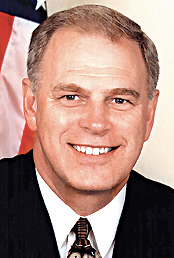Governor seeks cut in children’s services

Ohio Governor Ted Strickland (D-Lisbon)
Thousands of disabled
children could be affected, service providers said.
COLUMBUS (AP) — A rule proposed by Gov. Ted Strickland’s administration would limit some specialized services for disabled children who are eligible for Medicaid payments, causing an outcry from parents of children with autism, mental retardation and developmental delays.
The administrative rule is an attempt to head off a potential federal crackdown on how the state uses Medicaid money for children’s disability services, state officials said. While federal regulators have not asked Ohio to make the change, other states with similar systems have been penalized with loss of federal aid.
The rule would cut specialized services for children who are often developmentally delayed, nonverbal and aggressive. Some disabled children receive 35 to 40 hours of services costing up to $92 an hour, including early intervention programs and therapy. Those services don’t meet the reimbursement criteria set up by Medicaid, which pays the bulk of the money.
Directors Helen Jones-Kelley of the Department of Job and Family Services, Sandra Stephenson of the Department of Mental Health and John Martin of the Department of Mental Retardation and Development Disabilities spoke with parents of disabled children and service providers in a two-hour meeting about the rule Friday in Columbus.
“This is my son, not yours,” said Tina Vetter of Columbus, whose 5-year-old son Murphy has both autism and Down syndrome. “You have no idea what it’s like. I can’t do this by myself.”
State officials said they don’t know for sure how many children will be affected, but service providers said it could be thousands.
Service providers and parents said they want the state to delay implementing the rule until officials know how many people will be affected and how services will be replaced. Children suffering from severe disabilities can make great strides through treatment, they said.
“When I look at the rule changes, it’s devastating,” said Dr. Jacqueline W. Wynn, a treatment specialist from the autism center at Nationwide Children’s Hospital. “It tells me that Medicaid is not interested in providing services to people with this mental illness.”
State officials said the rule is needed to avoid a federal budget crackdown.
“We care deeply that all children in need have access to care,” Jones-Kelley said. “But we need to protect the Medicaid program we have.”
Strickland agrees with the proposed rule change, said spokesman Keith Dailey.
 43
43
